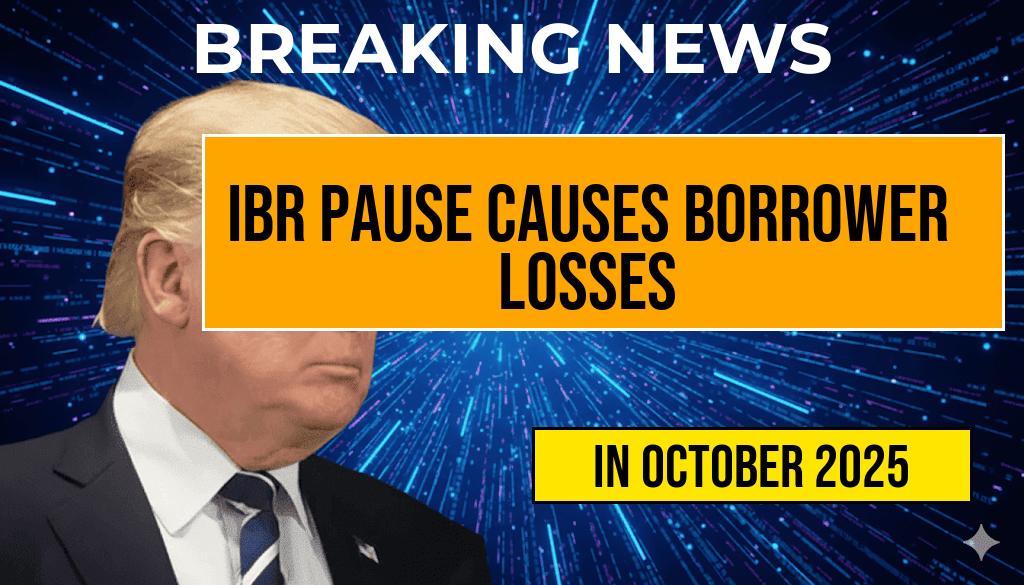IBR Pause Triggers Unexpected Financial Hardship for Borrowers; Refunds Under Review with Date Pending
Hundreds of borrowers across the United States have reported significant financial setbacks following an unexpected pause in their Income-Based Repayment (IBR) plans, a key component of federal student loan management. The pause, which was intended to provide temporary relief during ongoing administrative adjustments, inadvertently caused some borrowers to miss out on crucial benefits, leading to losses exceeding several hundred dollars in some cases. While the Department of Education has assured affected individuals that refunds are forthcoming, an official timeline for these reimbursements remains undetermined. This development has sparked concern among borrowers already navigating a complex repayment landscape amid broader student debt policy debates.
Background on the IBR Program and Recent Changes
The Income-Based Repayment (IBR) plan is designed to make federal student loan payments more manageable by adjusting monthly amounts based on income and family size. Since its inception, millions of borrowers have relied on IBR to avoid default and maintain manageable repayment schedules. Recently, the Department of Education announced a series of administrative updates aimed at streamlining processing and improving user experience. However, these changes coincided with an unanticipated pause in IBR plan operations, which affected certain borrowers’ payment cycles and benefits.
How the Pause Caused Financial Losses
The pause, which lasted several weeks, was implemented to address technical glitches and update systems. Unfortunately, during this period, some borrowers experienced disruptions that resulted in missed payments or delayed credit for their qualifying payments. Notably, some borrowers who had already made payments based on their income estimates saw these payments not correctly counted toward forgiveness or credit milestones. In more severe cases, borrowers with impending forgiveness deadlines faced setbacks, incurring additional interest or penalties.
| Number of Borrowers | Estimated Loss Range | Common Issues Reported |
|---|---|---|
| Approximately 300 | $200 – $600 | Missed payments, delayed credit, interest accumulation |
| Over 150 | Up to $1,000 | Forgiveness delays, default risks |
| Several dozen | Variable | Incorrect account credits, repayment plan resets |
Official Response and Refund Plans
The Department of Education acknowledged the issues caused by the temporary pause and assured affected borrowers that measures are being taken to rectify the situation. A spokesperson stated, “We recognize the inconvenience this has caused and are working diligently to process refunds and correct account discrepancies.” However, the department declined to specify an exact date for the refunds, citing ongoing administrative reviews and system updates.
Implications for Borrowers and Future Policy
For borrowers, especially those nearing forgiveness thresholds or relying heavily on IBR payments to manage finances, the disruption has added layers of uncertainty. Financial advisors emphasize the importance of maintaining detailed records of payments during this period and staying in close contact with loan servicers.
The incident has also fueled broader discussions about the resilience of federal student loan systems, especially as the Biden administration explores further reforms. Experts warn that technical hiccups, if unaddressed, risk undermining public confidence in federal student aid programs. Advocacy groups urge the Department of Education to accelerate refunds and implement safeguards to prevent similar issues in the future.
What Borrowers Should Do Now
- Review account statements: Borrowers are encouraged to verify their payment histories and account credits through their loan servicers’ portals.
- Document discrepancies: Keeping detailed records of payments made during the pause can support refund claims.
- Contact loan servicers: Borrowers should reach out proactively to clarify their account status and inquire about refund procedures.
- Stay informed: Monitoring official channels and the Department of Education’s announcements can provide updates on refund timelines and process changes.
Looking Ahead
The Department of Education has committed to resolving the issue but has not provided a specific timeline. As the department works through technical adjustments and policy reviews, affected borrowers remain in limbo. Experts recommend borrowers remain vigilant and prepared to follow up on their cases. Meanwhile, this incident underscores the importance of transparent communication and robust system checks to ensure that administrative updates do not inadvertently harm those they aim to support.
For additional resources on federal student loan management and borrower rights, visit the Federal Student Aid website or consult trusted financial advisory sources like Forbes or the Consumer Financial Protection Bureau.
Frequently Asked Questions
What caused the IBR pause and how did it affect borrowers?
The IBR pause was implemented temporarily, which led to hundreds of dollars in losses for some borrowers by delaying their income-based repayment plans and affecting their payment schedules.
Are borrowers who experienced losses eligible for refunds?
Yes, borrowers who incurred financial losses due to the IBR pause are promised refunds. However, the specific date when refunds will be processed has not yet been determined.
When will the refunds be available to affected borrowers?
The Department of Education has stated that the refunds will be issued, but the exact date is still to be determined. Borrowers are advised to stay updated for official announcements.
How can affected borrowers prepare for the upcoming refunds?
Borrowers should review their loan accounts and contact their loan servicers to ensure their contact information is current and to receive updates on the refund process.
Will the IBR pause impact future loan repayments?
The IBR pause was a temporary measure and is not expected to impact future loan repayments once normal repayment schedules resume. Borrowers should monitor official communications for any changes.

Leave a Reply